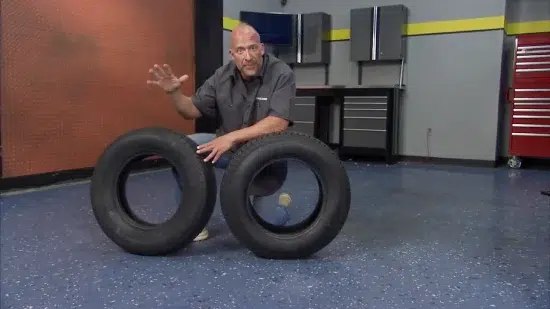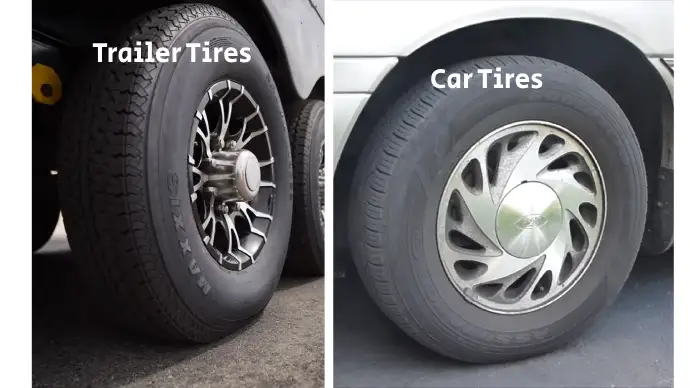Last Updated on August 13, 2023
Choosing a vehicle tire may seem trivial but it can significantly impact your journey’s safety and efficiency. Although trailer and car tires may seem similar initially, they have distinct design variations tailored to their specific purposes. For safe and optimal performance, you should know how these two types differ.
Trailer tires are specifically engineered to withstand load hauling and towing applications. They prioritize load capacity, durability, and stability. While car tires are designed to handle, traction, and perform better under normal conditions. They are built to respond to acceleration, braking, and turning requirements.
Today we’ll explore the differences between trailer and car tires, their respective strengths and weaknesses, and which is the better option for your road trip. Read on if you want to travel on the road more safely.
Trailer Tires vs Car Tires: Key Differences

Trailer and car tires are designed to serve different purposes and exhibit different performance characteristics. Here are some key differences between these two types of tires:
- Purpose and Performance Characteristics:
- Designation and Markings:
- Tire Sizes:
- Construction Types:
- Rubber Composition:
- Sidewall Thickness and Tread Width:
- Load Capacity and Load Ratings:
- Speed Ratings:
- Interchangeability and Consequences:
Purpose and Performance Characteristics:
Car tires are engineered with a primary focus on optimizing performance and handling, with a recent study revealing that high-performance car tires can improve braking distance by up to 15% compared to standard tires.
These tires are designed to respond precisely to acceleration, braking, and turning requirements, providing excellent traction and grip on the road.
Trailer tires are specifically designed to withstand load transportation and towing applications. These tires prioritize load capacity, durability, and stability, making them suitable for the heavy loads that trailers carry.
Designation and Markings:
The classification and labeling system used for different types of tires is an essential aspect of tire engineering and plays a crucial role in determining their suitability for various applications.
Trailer tires are designated as ‘ST’ tires, indicating their specific use for trailers. On the other hand, car tires bear a ‘P’ or ‘LT’ code. These markings are important because they indicate what type of automobile the tire is designed for.
The markings on trailer tires provide valuable information about their load capacity, speed rating, and construction type (bias ply or radial ply). This information is important for trailer owners to understand because it helps them choose the right tire for their specific needs.
Tire Sizes:
One of the critical factors in determining the performance and handling of a vehicle or trailer is the size of its corresponding tire. Car tires come in various sizes, depending on the specific vehicle make and model, optimizing performance and handling characteristics.
The size of a car tire typically ranges from 13 inches to 22 inches in diameter, with varying widths and aspect ratios. The width of a tire affects its grip, while the aspect ratio impacts the tire’s height and stability.
A larger aspect ratio indicates a taller tire with increased stability, while a smaller aspect ratio means a lower tire with improved handling.
Trailer tires, on the other hand, are typically larger in size compared to car tires. The increased size supports the additional weight of the trailer, ensuring proper load distribution and stability. Trailer tires can range from 8 inches to 16 inches in diameter, with varying widths and ply ratings.
The ply rating of a tire indicates its strength and ability to carry a load. The higher the ply rating, the more weight a tire can carry. Therefore, when selecting tires for a trailer, it is crucial to choose a size and ply rating that aligns with the weight and size of the trailer to ensure optimal performance and stability.
Construction Types:
Radial ply construction offers improved fuel efficiency and a smoother ride, making it a preferred choice for those seeking a more environmentally conscious and comfortable driving experience.
This construction type features reinforcing belts that run perpendicular to the tire’s circumference, resulting in less rolling resistance and better traction. As a result, radial ply tires are often used in cars, where fuel efficiency and responsiveness are highly valued.
Conversely, there are two types of trailer tires: D and R. They are available in both bias ply and radial ply construction. Bias ply tires feature a diagonal or crisscrossed internal structure, providing increased durability and resistance to punctures.
However, this construction type often results in a harsher ride and lower fuel efficiency compared to radial ply tires. As a result, those who frequently tow trailers may opt for radial ply trailer tires to improve their driving experience and reduce their environmental impact.
| Construction Type | Advantages | Disadvantages |
| Radial Ply | Improved fuel efficiency, smoother ride, better traction | Higher cost, less durability in extreme conditions |
| Bias Ply | Increased durability, resistance to punctures | Harsher ride, lower fuel efficiency |
Rubber Composition:
Moving on from the construction types of trailer tires and car tires, it’s important to consider the rubber composition used in their construction.
As mentioned earlier, trailer tires are designed to withstand heavier loads and higher stress, which is why they are constructed with a more durable rubber compound.
The rubber used in trailer tires is specifically formulated to handle the weight and pressure associated with towing, ensuring that they last longer and are less prone to wear and tear.
In contrast, car tires are made from a softer rubber compound that prioritizes traction, comfort, and responsiveness. While this type of rubber is ideal for everyday driving and provides a smoother ride, it can wear down more quickly when subjected to heavy loads.
This is why it’s crucial to use the right type of tire for your specific needs, whether you’re towing a trailer or simply driving your car around town.
Sidewall Thickness and Tread Width:
The thickness of a tire’s sidewall and the width of its tread are crucial considerations when choosing between trailer tires and car tires.
Trailer tires are designed with thicker sidewalls to handle heavy loads and provide stability while towing. This construction minimizes trailer swaying, which is especially important when transporting large loads.
In contrast, car tires typically have thinner sidewalls, allowing for improved responsiveness, handling, and traction on various road surfaces. This design enables car tires to respond better to the driver’s inputs during acceleration, braking, and turning.
Trailer tires also tend to have a narrower tread width than car tires. This is because trailer tires prioritize load-bearing capacity over power transfer during acceleration, braking, and turning. The narrow tread width enables trailer tires to distribute the weight of the load evenly, reducing the risk of tire damage and wear.
Load Capacity and Load Ratings:
Load capacity and load ratings are important factors to consider when selecting appropriate tires for a vehicle. Trailer tires are specially designed to handle heavier loads compared to passenger car tires.
Here are some key factors to consider regarding load capacity and load ratings:
- Trailer tire load ratings are often indicated by load range levels, which are based on ply ratings. The higher the load range, the higher the load capacity of the tire.
- It is crucial to ensure that the trailer tire’s load rating is sufficient to carry the weight of the trailer and its contents. Overloading a trailer tire can lead to tire failure, accidents, and damage to the trailer.
- Passenger car tires generally have lower load ratings compared to trailer tires. Using passenger car tires on a trailer can lead to tire failure, causing severe damage to the trailer and endangering the driver and passengers.
Speed Ratings:
When considering speed ratings, it is important to note that tires with higher speed ratings are designed to withstand greater driving pressures and are, therefore, more suitable for high-performance vehicles.
These tires are typically found on cars and are rated Q (99 mph), T (118 mph), H (130 mph), V (149 mph), and even higher for high-performance vehicles. It is crucial to match the speed rating of your tire with your driving conditions to ensure safe and efficient travel.
Conversely, trailer tires typically have lower speed ratings as they prioritize load hauling and stability over high-speed performance. Trailer tires are rated L (75 mph) or M (81 mph) to ensure smooth and safe hauling of heavy loads, which is why they are commonly used in trailers and RVs.
Interchangeability and Consequences:
Interchanging car tires with trailer tires or vice versa can have dangerous consequences. Trailer tires are not designed to handle the stresses of towing and may result in blowouts, reduced stability, and compromised performance.
Using car tires on a trailer can also lead to premature wear or tire failure due to the inability to respond to trailer-specific issues such as acceleration, braking, and cornering forces.
Therefore, it is crucial to ensure that the appropriate type of tire is used for each application. The consequences of using the wrong type of tire can be severe. Blowouts can cause the driver to lose control of the vehicle, leading to accidents and injuries.
Reduced stability can make it difficult to control the trailer, especially at high speeds or on uneven terrain. Compromised performance can result in poor handling and increased fuel consumption.
What are the types of trailer tires?

Trailer tires come in two main types: Bias, Ply, and Radial.
Bias Ply Trailer Tires:
Despite being an older technology, bias-ply trailer tires still offer superior load capacity and stability compared to their newer counterparts. The thicker and sturdier construction of bias-ply tires makes them suitable for trailers of all sizes, from small to E-rated.
The angled ply placement provides better load durability and damage resistance, while the bias construction helps stabilize the tire and resist swaying during towing.
While radial-ply tires have become more popular in recent years, bias-ply tires remain relevant due to their advantages in load capacity and stability. These tires are especially useful for heavy-duty trailers that require a high load capacity and stability during transportation.
Despite the drawbacks of bias-ply tires, such as a rougher ride and shorter lifespan compared to radial-ply tires, they are still a preferred choice for many trailer owners due to their superior load capacity and stability.
Radial Trailer Tires:
Moving on from bias ply trailer tires, another option for trailer tires is radial trailer tires. These tires prioritize smooth towing and heat resistance, making them a popular choice among trailer owners. Radial tires feature belts placed at 90-degree angles, enhancing their durability and performance.
Additionally, their steel belt structure allows for better fuel efficiency, longer tread life, and smoother overall performance.
One of the key benefits of radial trailer tires is their ability to stay cool while operating, avoiding heat build-up. This is especially important for trailers that carry heavy loads for extended periods of time. With thicker sidewalls, radial tires can also handle heavier loads than car tires.
Benefits of radial trailer tires:
- Improved durability and performance with belts placed at 90-degree angles
- Better fuel economy, longer tread life, and smoother performance
Advantages for trailer owners:
- Can handle heavy loads with thicker sidewalls
- Remain cool during operation, avoiding heat build-up.
Can car tires be used as trailer tires?
Using car tires on a trailer is not recommended due to their flexible sidewalls and lack of engineering for stabilizing heavy loads and handling high temperatures. Car tires are not designed to carry the weight and stresses of a trailer, which can lead to tire failure and accidents.
Car tires are engineered to provide a smooth and comfortable ride for passengers, which means their sidewalls are flexible. This flexibility allows the tire to absorb shocks and vibrations on the road, but it also makes them unsuitable for trailer use.
Trailer tires, conversely, have stiffer sidewalls that provide better stability and handling for heavy loads. They are designed to withstand higher temperatures and provide better traction on the road.
In addition, trailer tires are engineered to handle the unique stresses of trailer use, such as the lateral forces that can occur during turns. Using car tires on a trailer may seem like a cost-effective solution, but it is not worth the risk of a tire failure that could result in an accident and serious injury.
Are trailer tires stronger than regular car tires?

Compared to typical passenger vehicle tires, Special Trailer (ST) tires are constructed with heavier-duty materials, making them more durable and able to handle higher loads and temperatures.
One interesting statistic is that ST tires are designed to last up to 40% longer than regular car tires. This is because ST tires are built with stronger sidewalls to prevent excessive flexing, which can lead to heat buildup and tire failure.
Additionally, the tread patterns on ST tires are optimized for trailer use, providing better traction on both wet and dry surfaces.
One advantage of using ST tires is that they are specifically designed for trailer use, providing better stability and handling while towing. Furthermore, ST tires have a higher load capacity than regular car tires, making them suitable for heavier loads.
However, it’s important to note that ST tires should not be used on passenger vehicles since they are not designed for high speed driving or cornering.
How fast can you go with trailer tires?
Trailer tire ratings typically have a maximum speed limit between 55 and 75 mph, which is lower than the speed limit for most highways in the United States.
This is because they are designed to carry heavy loads and provide stability to the trailer. Going beyond the set speed limit for trailer tires can lead to overheating, tire blowouts, and accidents.
It is crucial to follow the manufacturer’s recommendations on the maximum speed limit for your trailer tires and avoid exceeding it. However, ST tires, designed for special trailers, can handle speeds of 80 mph and beyond. These tires are specifically engineered to handle higher speeds while providing stability and safety to the trailer.
How many miles do 14 ply trailer tires last?
The lifespan of 14-ply tires used on trailers can vary depending on factors such as quality, road conditions, and the weight of the load, but typically they can last between 3-4 years or 10,000-12,000 miles.
It is important to note that the lifespan of these tires is subject to variation and may be affected by factors such as improper maintenance, high speeds, and extreme temperatures.
To ensure maximum lifespan for 14-ply trailer tires, it is recommended that they are regularly inspected for wear and damage, properly inflated to the recommended pressure, and not used beyond their load capacity.
Additionally, avoiding overloading the trailer and driving at excessive speeds is important, as these can lead to premature tire wear and damage.
Trailer Tires vs Car Tires: Know the Key Differences
Don’t mistake trailer tires for car tires! Though they may look alike, their significant differences set them apart. Trailer tires are made for the specific purpose of hauling a trailer, while car tires are meant for passenger vehicles.
Trailer tires have a stronger sidewall, a stiffer construction, and a higher load capacity than car tires. They are also designed to withstand heat and heavy loads for extended periods, making them ideal for long-distance hauling.
While car tires may seem like a viable option for use on trailers, it is strongly advised against using them as a replacement for trailer tires. Car tires are not equipped to handle the heavy loads and high speeds associated with trailer hauling.



